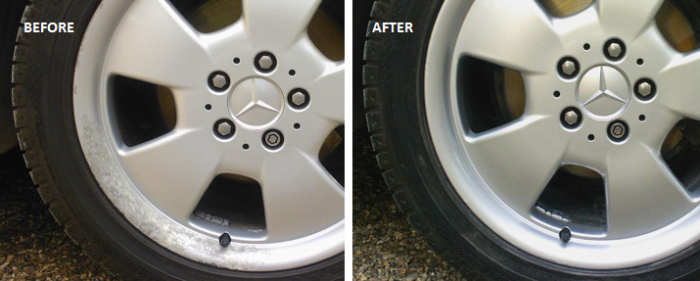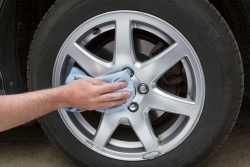When you first see your alloy wheels in pristine condition, you are super protective and wary about scratching or scuffing them, but inevitably imperfections can occur. If you’re an avid driver or someone that travels for work frequently, your alloys are likely to come into contact with objects that may cause damage to them from time to time.
Common offenders for damaging alloy wheels are kerbs, stray objects and Britain’s infamous potholes. Thankfully, when damage does strike you can get your alloy wheels repaired. However, there are steps that can be taken to protect your alloy wheels. We have produced a handy guide with all the tips and tricks you need for alloy wheel protection.

Tyres can protect your alloy wheels if they are high profile tyres or if the tyres come with a rim protector.
High profile Tyres
The profile of a tyre can be determined by the distance between the rim of the wheel and the outer edge of the tyre touching the road. Whilst there is no set measurement, if there is a significant distance you are able to deem your tyres high profile.
Low profile Tyres
On the other hand, low profile tyres are those that have an approximate value of 50 with a shorter distance between the rim and the road. These type of tyres are less likely to protect your alloy wheels from damage.
Whilst we can prevent scraping our alloys on kerbs, potholes are a real problem for UK motorists so adapting our driving technique is the best way to try and minimise any damage.
Alloy wheel protectors help preserve the appearance of your alloys whilst acting as a barrier against any potential damage. They protect the edges or rims, so when contact does strike they’ll take the impact of the damage, not your actual alloys.
They come in a selection of colours and be used to enhance the look of your car. You can find more information about alloy wheel protectors here.
Come rain, or shine there are always times when our alloys can become exposed to potential damage, however driving in the winter can cause that possibility to rise with far more hazardous conditions to consider, such as a higher probability of slippery roads, salted roads, lower visibility when driving and parking up, and blustery conditions causing more stray objects such as loose branches to be laid on the road.
To contend with these conditions, you can prepare your alloys by taking the following steps;
Most alloy wheel manufacturers have a preferred sealant, which will protect your alloys from salt and dirt particles. They work by creating a barrier against corroding contaminants.
In addition, you may opt to invest in a set of winter tyres, which are heavy-duty and provide more grip against wintery conditions.
The tyres on your car contend with the most amount of dirt and are probably the hardest area of a car to keep clean. However, it’s worth noting that when you do clean your car whether it’s yourself or you take it to a car cleaner, make sure you use the right wheel cleaners for the job. Some wheel cleaners are acid-based and can actually remove the lacquer if not used correctly or left on longer than the time indicated. Here are a few ways to clean your alloy wheels.
Driving Techniques
No matter how good a driver you are, unfortunately, damage can occur. Whilst you can control your driving abilities, you cannot account for other drivers on the road. Avoiding another driver by driving over an unexpected pothole, sometimes means damage to your alloy wheels is unavoidable. Having said this, adapting your driving style can be a sure step to protecting your alloy wheels. If you are uncomfortable with parallel parking, maybe try and avoid tight spaces and busy roads.
How to Powder Coat Alloy Wheels?
 Even when we try our hardest, alloy wheels can become damaged but there is no need to worry. ChipsAway are experts in alloy wheel repair, they will have your alloys repaired to their prime condition in no time. They can also attend to minor dents, paintwork scratches and bumper scuffs. With experts nationwide, there won’t be one too far from you. Just call 0800 145 5118, or arrange a free estimate via our online contact form. You can also find out more about Alloy Wheel Repair on our website.
Even when we try our hardest, alloy wheels can become damaged but there is no need to worry. ChipsAway are experts in alloy wheel repair, they will have your alloys repaired to their prime condition in no time. They can also attend to minor dents, paintwork scratches and bumper scuffs. With experts nationwide, there won’t be one too far from you. Just call 0800 145 5118, or arrange a free estimate via our online contact form. You can also find out more about Alloy Wheel Repair on our website.






